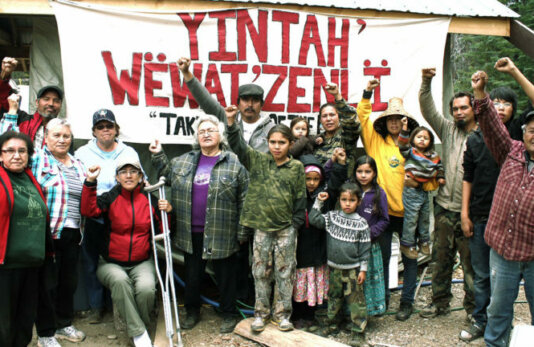FairPlanet.Support
| topic: | Indigenous people |
|---|---|
| tags: | #indigenous rights, #pipelines, #Canada, #NGO, #donation, #volunteer |
| located: | Canada |
| by: | Yair Oded |
Despite ostensible attempts at reconciliation made by the Canadian government following centuries of oppression and colonisation, indigenous nations continue to be deprived of their rights and lands across Canada, as the government does not only discriminate against them in provision of services but also operates industrial projects that tear through their territory.
Various development initiatives, including gas pipelines stretching hundreds of miles, are currently being constructed through indigenous territory in Canada, some of which are now owned by the Canadian government itself.
One such project, the Coastal GasLink (CGL), recently got a green light to begin construction through the Wet’suwet’en nation’s territory, despite the fact that the construction plan ignores recommendations to protect wetlands in the area - thus harming the environment and jeopardizing the local indigenous clans’ sources of income.
The Unist’ot’en is a movement launched by the Unist’ot’en clan of the Wet’suwet’en nation, working to preserve indigenous lands, protect their tribes’ rights, and resist government agencies and corporations invading their territory and threatening their sovereignty.
The Unist’ot’en have mounted a vigorous campaign to fight the Coastal GasLink (CGL) pipeline and spread the word about their nation’s resistance - a fight that the mainstream and right wing media in Canada tries to muffle.
The movement also provides extensive background information about the struggle of indigenous nations in Canada, the ongoing threat to their lives and lands by the government and industry giants, and the various projects and campaigns they run in order to defend themselves and their territories.
Among their numerous projects and campaigns, The Unist’ot’en have established The Healing Centre, which offers programs that are predicated on the connection to and traditional usage of the land. The centre, which was constructed from donated materials and volunteer labour, now offers treatment for addictions, women’s groups, cultural workshops, and language schools.
“The proposed pipelines are a threat to the watershed, as well as the plants, animals and communities that depend on them. The Unist’ot’en are fighting for the future health of the land. They are protecting the traditional hunting, trapping, and fishing territories to ensure that the natural beauty and bounty of the earth will be enjoyed for generations to come,” The Unist’ot’en state.
On their website you can access information about their ongoing campaigns as well as on the history and facts behind their struggle. You can also access support tool-kits and learn about various ways in which you can help their cause, including volunteering, campaigning, fundraising, and donating.
Due to the spread of COVID-19, access to the Wet’suwet’en territory is strictly limited. Be on the lookout for updates on their website, where you could also be instructed on how to help remotely.
Image: The Unist’ot’en
By copying the embed code below, you agree to adhere to our republishing guidelines.
